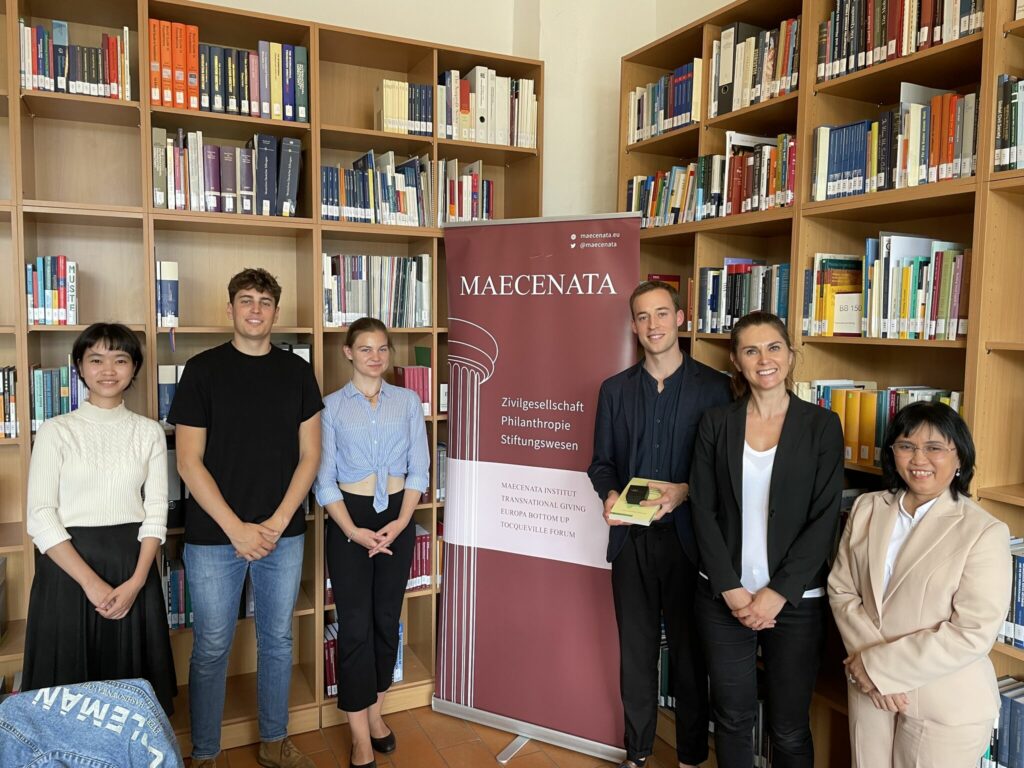By Lorenzo Cima, Andżelika Natalia Serwatka and Nhi Mai Thi Yen
During our Transcultural Caravan Research trip to Berlin our group visited the Maecenata Foundation, in our investigation into transcultural relations between Germany and Morocco, and more broadly between Europe and the MENA region.
In the meeting at the Maecenata Foundation, we had the chance to talk to Dr Dennis Kumetat, the spokesman for the German Foreign Ministry in the Middle East and North Africa, Turki Al-Balushi, a journalist engaged in the Arabic civil society, and Finn Büttner, a representative from the Maecenata Foundation.

This represented an important opportunity in the development of our research project, bringing interesting contributions and considerations. First, we realized that although countries in the Middle East share various commonalities, each country has its own unique culture, history, and stories, leading to a need for differentiated perspectives on each region when studying the Middle East. We also learned how, during the research process, it is vital to avoid any kind of romanticism which could result in overemphasis of the positive, neglect of the historical, social, and political context of a topic or issue, and subjectivity. To avoid this during research, the speakers advised us to be aware of our own biases, use various sources, and be open to different perspectives.
Moreover, we had the chance to highlight how the contemporary Arab world is not just a geographical area but also a complex mosaic of different cultures, economies, and political priorities, depicting an extremely heterogeneous society. This diversity shapes the goals and priorities of different Arab states and what they expect from other countries as partners, including Germany.
The Arab Spring also represents a significant factor in understanding the MENA region. As all the speakers mentioned, it was a turning point in the history of Arab countries, paving the way for the emergence of civil society. On the other side, post-2011 Germany also increased its openness to refugees from the MENA region and started becoming more open to liberal change, but it became particularly visible after 2015 when the migration crisis reached its peak. Consequently, this approach sparked internal debates in Germany about migration and integration.
Regarding the object of our research and the focus on challenges in German-Arab relations, the significance of the Palestinian question was emphasised too. Furthermore, we deeply realized the importance of the cultural aspects of cooperation, as culture and language play a crucial role in international relations. German foreign policy typically aims to separate culture from politics, but in the MENA region, culture is closely tied to politics, posing a challenge in building relationships. Understanding the language as a cultural element is also important, as proficiency in the region’s languages can be a key to effective communication and cooperation. Studying Arab countries without the knowledge of their language is a mistake reminiscent of the 19th century when researchers, including Germans, approached the Orient “from behind their desks in European salons”, furthermore using European translations of Arab texts.
Finally, when it comes to cooperation it’s worth noting the aspect of development aid and assistance. In the case of Germany, we assisted in a shift of its approach, as it aimed to engage more in partnership initiatives with recipient countries. This flexible approach allowed projects to be tailored to local needs, reducing inequalities. For example, Germany sought sustainable energy sources and explored partnerships with different Arab countries with great potential in renewable energy such as wind and solar power, opening new opportunities for economic cooperation.
By choosing to cooperate with Morocco, Germany is avoiding the colonization-related conflicts that affect other countries such as France, representing a step towards building positive relations and avoiding controversy.
To sum up, the relations between Germany and Arab countries are dynamic and require an understanding of the region’s diversity possible only through a flexible approach. Germany aims to build lasting cultural, economic, and political relationships but must consider the specific needs and aspirations of each Arab country to succeed in this cooperation.
We would like to express our sincere gratitude to the Maecenata Foundation for providing us with the opportunity to interview the experts. Their insights have been invaluable to Transcultural Caravan Group.
